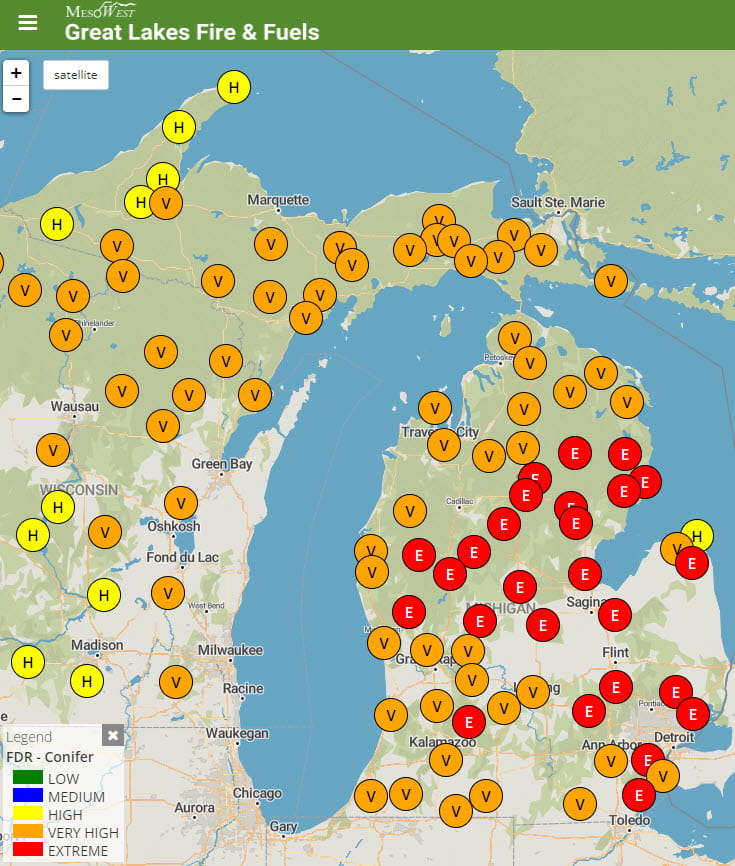The web Browser you are currently using is unsupported, and some features of this site may not work as intended. Please update to a modern browser such as Chrome, Firefox or Edge to experience all features Michigan.gov has to offer.
Fire danger is high across Lower Peninsula; be careful outside
May 17, 2023
This MI Environment is courtesy of the Michigan Department of Natural Resources.
The Michigan Department of Environment, Great Lakes, and Energy (EGLE) joins in cautioning Michiganders about the danger of fires under current weather conditions. In particular, EGLE notes that it is illegal to burn plastic, hazardous materials, foam or other household trash. This can release dangerous chemicals into the air.
For more details, check EGLE’s open burning webpage.
Warm temperatures, winds and winter buildup of dry grasses and leaves have pushed fire danger to very high levels across the Lower Peninsula.
Map showing where fire danger currently exists in Michigan.
“People need to be careful when doing any outdoor activity that could spark a wildfire,” said Don Klingler, Michigan Department of Natural Resources resource manager for the southern Lower Peninsula. “These fuels can ignite very easily.”
Nine out of 10 wildfires are caused by people, and yard debris burning is the top cause of wildfires in Michigan.
Burn permits will not be issued for the next few days, Klingler said. It’s always critical to check Michigan.gov/BurnPermit before you start your fire to make sure weather conditions allow for safe burning. In southern Lower Peninsula communities, consult local fire authorities.
Fire danger goes up when weather is hot and dry and increases even more when it’s windy. Windborne embers can travel far and fast, turning a small fire into a large one. Lightning strikes are also an issue if stormy weather is predicted.
Due to the increased fire danger, the DNR has suspended most prescribed burns over the next few days.
Snow is still present in parts of the Upper Peninsula, but people should exercise caution in areas without snow.
Safety tips to keep fires under control
When you’re working with fire or equipment outdoors, keep in mind that fires can take off very fast and that the remains of a fire smolder for some time. Here are some tips to keep it safe out there:
- Contain your campfire or bonfire in a pit or ring and make sure you put it out thoroughly before leaving for the night. Douse the fire with water, stir the ashes and douse again.
- Never leave any fire — including hot coals — unattended.
- Keep a hose or other water source nearby when burning.
- Prevent sparks. Keep trailer chains from dragging when you’re on the road; don’t park hot equipment on dry grass.
- Never shoot fireworks into the woods, dry grass or shrubs.
- Get more fire safety tips at Michigan.gov/FireManagement.
- It’s illegal to burn plastic, hazardous materials, foam or other household trash. This can release dangerous chemicals into the air.
- You can use a burn barrel with a screen on top to burn paper, leaves and natural materials.
DNR wildland firefighters have a goal of keeping as many wildfires fires as possible under 10 acres in size. Get more fire tips and learn more about the DNR’s fire programs.
